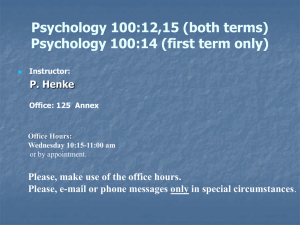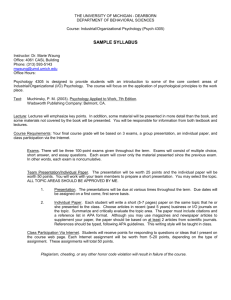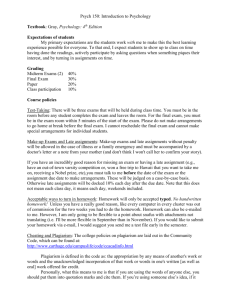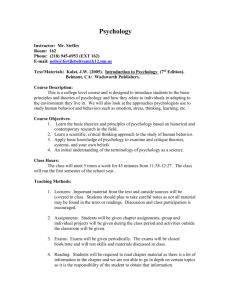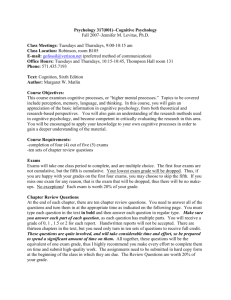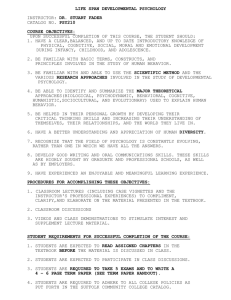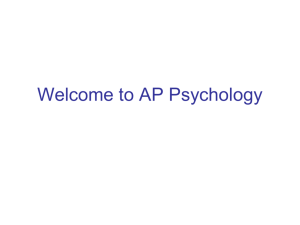PSY 495 Special Topics: Community Psychology: International
advertisement
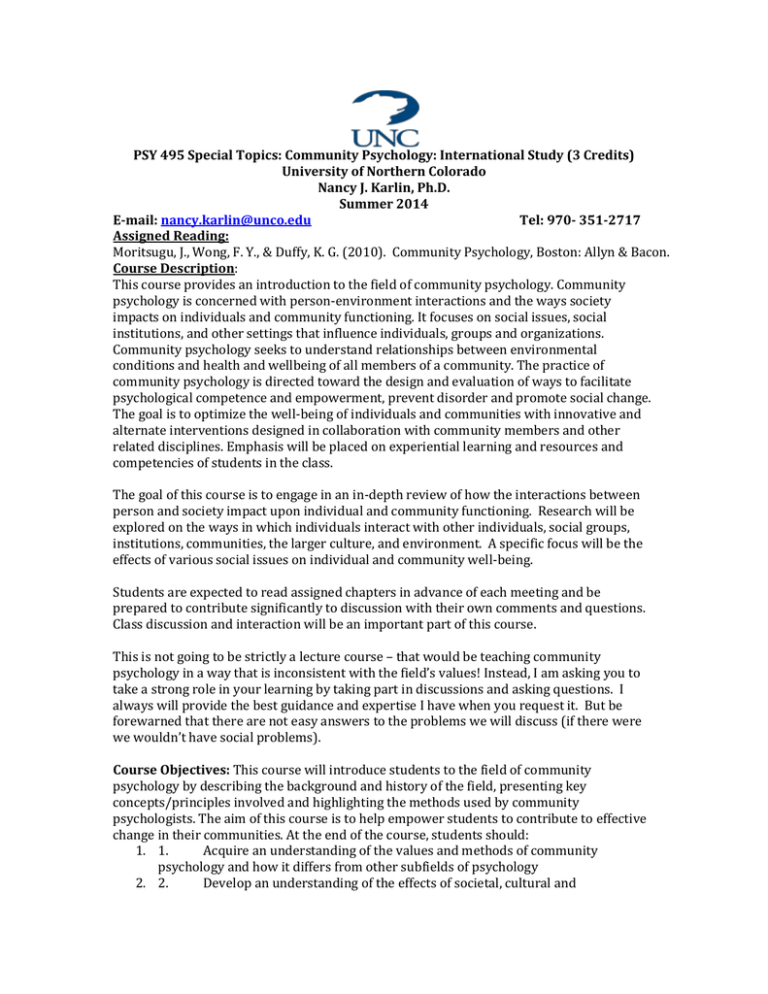
PSY 495 Special Topics: Community Psychology: International Study (3 Credits) University of Northern Colorado Nancy J. Karlin, Ph.D. Summer 2014 E-mail: nancy.karlin@unco.edu Tel: 970- 351-2717 Assigned Reading: Moritsugu, J., Wong, F. Y., & Duffy, K. G. (2010). Community Psychology, Boston: Allyn & Bacon. Course Description: This course provides an introduction to the field of community psychology. Community psychology is concerned with person-environment interactions and the ways society impacts on individuals and community functioning. It focuses on social issues, social institutions, and other settings that influence individuals, groups and organizations. Community psychology seeks to understand relationships between environmental conditions and health and wellbeing of all members of a community. The practice of community psychology is directed toward the design and evaluation of ways to facilitate psychological competence and empowerment, prevent disorder and promote social change. The goal is to optimize the well-being of individuals and communities with innovative and alternate interventions designed in collaboration with community members and other related disciplines. Emphasis will be placed on experiential learning and resources and competencies of students in the class. The goal of this course is to engage in an in-depth review of how the interactions between person and society impact upon individual and community functioning. Research will be explored on the ways in which individuals interact with other individuals, social groups, institutions, communities, the larger culture, and environment. A specific focus will be the effects of various social issues on individual and community well-being. Students are expected to read assigned chapters in advance of each meeting and be prepared to contribute significantly to discussion with their own comments and questions. Class discussion and interaction will be an important part of this course. This is not going to be strictly a lecture course – that would be teaching community psychology in a way that is inconsistent with the field’s values! Instead, I am asking you to take a strong role in your learning by taking part in discussions and asking questions. I always will provide the best guidance and expertise I have when you request it. But be forewarned that there are not easy answers to the problems we will discuss (if there were we wouldn’t have social problems). Course Objectives: This course will introduce students to the field of community psychology by describing the background and history of the field, presenting key concepts/principles involved and highlighting the methods used by community psychologists. The aim of this course is to help empower students to contribute to effective change in their communities. At the end of the course, students should: 1. 1. Acquire an understanding of the values and methods of community psychology and how it differs from other subfields of psychology 2. 2. Develop an understanding of the effects of societal, cultural and environmental influences on psychological and community well-being 3. 3. Explore the relationship between people and their environments and consider ways of improving this relationship 4. 4. Be able to think in terms of prevention or problems and alternatives to individually oriented services 5. 5. Become familiar with innovative program sand practices geared towards prevention and empowerment of disenfranchised groups 6. 6. Be able to apply their learning to a specific social problem that they identify in their community. Format: This course will combine lectures, discussions, and class participation as the form of teaching. There will also be at least one service-learning project, which will allow lecture material to be made practical. Course Requirements and Method of Evaluation: a) Attendance and class participation: Attendance, preparation and class participation are required. Students should be prepared to discuss topics in the readings and to answer and ask questions. They should also expect to relate what they learn in class to everyday life experiences, i.e. to discuss how the readings are related to their community experiences and personal experiences. There will be periodic in-class activities and assignments designed to increase student involvement and monitor student comprehension of course concepts. These activities may include response cards (brief written responses to the readings or lecture), guided group discussions, or guided group demonstrations/activities. At the end of the exercise, you will turn in your completed hand-outs (including each group participant’s signature) to be marked as completed or not. Participating in these class exercises will count as your participation grade. (50 points attendance and 50 points participation) b) Community Experience: Community Experience: In order to provide an experiential based learning, students will be required to engage in some community experience during the course. Shortly after arrival in England you will be asked to participate several seminars where you will be involved in an cross cultural academic environment. You will also be asked to engage yourself in the community. You MUST keep a journal of your community experience where you write down your thoughts, experiences, time spent with community, etc. (100 points). You MUST keep a journal of your community experience where you write down your thoughts, experiences, time spent with community, etc. Use lots of terms from the class and the book!!!!! HIGH LIGHT THE TERMS YOU ARE USING (bold, italics, highlight, underline, etc.). Write about your experience using Direct Observation (No value judgment, just the facts), Inference (Make an inference to the cause of an event), and Personal (How does this impact you). What Field Notes should look like: 1. 1. Direct Observation a. a. Exactly what did you see/experience b. 2. Inferential/Reflection Notes c. a. Finding clues, putting the clues together d. b. “They showed a lot of agitation” Why? e. 3. Personal Notes f. a. How did I feel (100 points) c) Exams There are three exams. These exams are NOT cumulative and consist only of material covered to that point. Exams consist of both multiple choice and short answer questions (300 points). Exam #1: 100 points (Chapters 1-5)(Social Change) ONLINE EXAM Exam #2: 100 points (Chapters 6 -8) ONLINE EXAM Exam #3: 100 points (Chapters 9-12)(Partnering with Community) ONLINE EXAM 500 points total for the course (attendance, participation, community experience, and exams) will be letter graded according to UNC +/- grading system. PLUS/MINUS Grading Scale used in this class is based upon final percentage: A 93-100%; A- 90-92.9%; B+ 87-89.9%; B 83-86.9%; B- 80-82.9%; C+ 77-79.9%; C 73-76.9%; C- 70-72.9%; D+ 67-69.9%; D 63-66.9%; D- 60-62.9%; F= below 59.9% Course Outline May 16th Students will meet from 8:00 a.m. to 11:00 p.m. for final in-class activities, guided discussion, and trip preparation. All exams will take place online prior to the start of the course with exam dates scheduled for April 14 beginning at 6:00 a.m. through midnight on the 18th (exam 1), April 21 through 25 (exam 2), and April 28-May 2 (exam 3). Exams become available at 6:00 a.m. on the start date and end at 11:59 p.m. on the final day of availability. May 18th- the group will travel to England. The exams are open book and found on Blackboard under the Assignments Tab. Extended Studies will register you for this course. The trip abroad will last until June 1, 2014. The University of Northern Colorado’s Student Code of Conduct (http://www.unco.edu/dos/student_code_conduct/student_conduct.html) and Honor Code (http://www.unco.edu/dos/honor_code/index.html) strictly prohibit any form of academic misconduct. Academic misconduct includes but is not limited to plagiarism, cheating, fabrication, and knowingly or recklessly encouraging or making possible any act of plagiarism, cheating, or fabrication. Academic misconduct is an unacceptable activity in scholarship and is in conflict with academic and professional ethics and morals. All incidents of alleged plagiarism or other forms of academic dishonesty will be investigated and violations of academic integrity will result in a consequence that may be as severe as an F in the class and a recommendation for expulsion. For more information on plagiarism and appropriate paraphrasing, please see: http://www.unco.edu/dos/honor_code/defining_plagiarism.html Students with disabilities: If you believe you may need accommodations in this course, please contact UNC Disability Support Services, voice/TTY (970) 351-2289 or fax (970) 351-4166, or visit www.unco.edu/dss as soon as possible to ensure that accommodations are implemented in a timely fashion. Notice The Office of Extended Studies reserves the right to cancel or reschedule courses based upon enrollment. Enrolled students will be contacted with information of any change. Student Satisfaction Evaluation Participants will be asked to evaluate the course for instructors’ knowledge, interest and enthusiasm as well as providing additional information on classes or topics you would like to see developed as a future offering from UNC. Course Withdrawal Information Students on academic probation will not be permitted to enroll in this study abroad program. It is important to return the registration form and $400 deposit to Center for International Education by Mon. January 27, 2014. If you drop this class after Fri. March 14, 2014 you will be responsible for payment of full tuition. In order to be eligible to receive any refund of tuition, you must come into the Office of Extended Studies (Michener Hall, Room L 0050) to formally withdraw from your class. Your refund, if applicable, will be based on the date of contact with our office. Failure to notify us will result in UNC tuition being owed even though you do not attend or complete the coursework.
